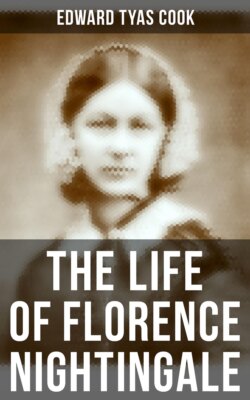Читать книгу The Life of Florence Nightingale - Edward Tyas Cook - Страница 48
На сайте Литреса книга снята с продажи.
IV
ОглавлениеThe formulating of a religion, whether for the tailors or others, is no short task, and Miss Nightingale's “Works” must have well filled her mind during otherwise unoccupied hours in 1852. But the “Works” were only bye-work. Her main concern was to continue her apprenticeship in nursing. Some vexatious delays and difficulties were still to be encountered, but she faced them with a brighter confidence than before, and the last stage of the struggle wears an aspect more of comedy than of tragedy. She had successfully asserted her independence once in going to Kaiserswerth. In an imaginary dialogue with her mother, she makes herself say, “Why, my dear, you don't suppose that with my ‘talents’ and my ‘European reputation’ and my ‘beautiful letters,’ and all that, I'm going to stay dangling about my mother's drawing-room all my life! I shall go and look out for work, to be sure. You must look upon me as your son. I should have cost you a great deal more if I had married or been a son. You must now consider me married or a son. You were willing to part with me to be married.” In presenting the case in this light to her parents, Florence had now a valuable ally in her Aunt Mai. Something of a diplomatist, as well as of a philosopher, was within the powers of that excellent woman. Without any interference which could be resented, by insinuating a word here, suggesting a phrase there, and pouring oil upon troubled waters everywhere, Aunt Mai did a good deal to smooth the last stages in her niece's struggle for independence.
Like all good diplomatists, the aunt sought first for a basis of compromise. She was able to sympathize with both sides. She was wholly favourable to her niece's aspirations and claims. But as a mother herself, she could enter into the case of her brother and his wife. It was not that they were selfishly obstructive; it was that, finding so much interest and enjoyment themselves in their own way of life, they desired in all love that the daughter should not deprive herself of the same privileges. But could not a compromise be arranged? Let it be agreed that Florence should spend part of each year in pursuit of what the mother considered her daughter's fancies, and spend another part at home. This was the arrangement which was in fact now in force.
The compromise served well enough for a while, but Florence wanted something more; and here, again, Aunt Mai's diplomacy prepared the way. With a good strategic eye, she saw that Mrs. Nightingale held the key of the position. Mr. Nightingale in his heart was at one with Florence. He admired her and believed in her; he was quite willing that she should go her own way, and was not reluctant to make her some independent allowance, such as would enable her to conduct a mission or an institution. But, as he said to his sister, whenever he broached anything of the kind to his wife and elder daughter, he found them united against him. Mr. Nightingale was one of those amiable men who are inclined to take the line of least resistance. It was Mrs. Nightingale's opposition, therefore, that had to be overcome. “Your mother,” reported the aunt, “would, I believe, be most willing that you undertake a mission like Mrs. Fry or Mrs. Chisholm,64 but she thinks it necessary for your peace and well-being that there should be a Mr. Fry or Captain Chisholm to protect you, and in conscience she thinks it right to defend you from doing anything which she thinks would be an impediment to the existence of Mr. F. or Captain C.” A good many mothers, even in these days, will, I doubt not, be on Mrs. Nightingale's side. But Aunt Mai, having made her sister-in-law define the position, pressed the advantage in an ingenious way. Florence was already thirty-two; and a time comes soon after that age when even the most sanguine mother begins to despair. It was agreed, accordingly, that “at some future specified age” Florence should be free to do the work of a Mrs. Fry or a Mrs. Chisholm without the protection of a Mr. F. or a Captain C. There was even some talk of obtaining a written agreement to that effect, specifying the age; but Aunt Mai thought better of such a plan, and contented herself with calling in another witness to the verbal understanding. This was the lady—Mrs. Bracebridge—who two years later was to accompany Miss Nightingale on a mission more renowned even than that of Mrs. Fry or Mrs. Chisholm. But from the point gained by Aunt Mai's diplomacy and Florence's own persistence, a logical consequence followed. Presently, at some future unspecified age, Florence was to be free to control some philanthropic institution; but what would be the use of being free to do so, unless she were also trained and qualified?
